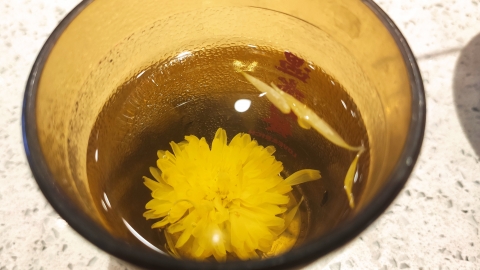Can chrysanthemum tea relieve thirst and stimulate saliva production?
Generally, chrysanthemum tea can provide some degree of thirst relief by promoting saliva production, but its effect is limited and proper method and quantity of consumption should be noted. Detailed analysis is as follows:

Chrysanthemum tea is slightly cold in nature and contains components such as chrysanthemum glycosides, amino acids, and vitamins. When steeped in hot water, the liquid can directly relieve thirst by providing hydration. Its active ingredients may also help alleviate dry mouth and throat caused by internal heat or dryness. For thirst caused by external wind-heat or internal heat conditions, moderate consumption of chrysanthemum tea may assist in relieving thirst by promoting saliva production.
However, the effect of chrysanthemum tea in quenching thirst is relatively mild. If thirst is caused by excessive sweating, dehydration, or other medical conditions, drinking chrysanthemum tea alone may not be sufficient to effectively relieve the symptoms. Moreover, due to its slightly cold nature, excessive consumption may irritate the gastrointestinal tract and lead to abdominal discomfort, especially for individuals with deficiency-cold of the spleen and stomach. Overconsumption may worsen internal cold symptoms, so it is important to control the amount consumed.
When drinking chrysanthemum tea, it is recommended to brew it with warm water, avoid making it too strong, and refrain from drinking it on an empty stomach to prevent gastrointestinal irritation. In daily life, if better thirst relief is desired, it can be brewed together with ingredients such as Ophiopogon root (Maidong) and Lycium berries (Gouqi). Additionally, maintaining adequate daily water intake, consuming more water-rich fruits and vegetables, and following a light diet can better help relieve thirst and maintain physical comfort.







